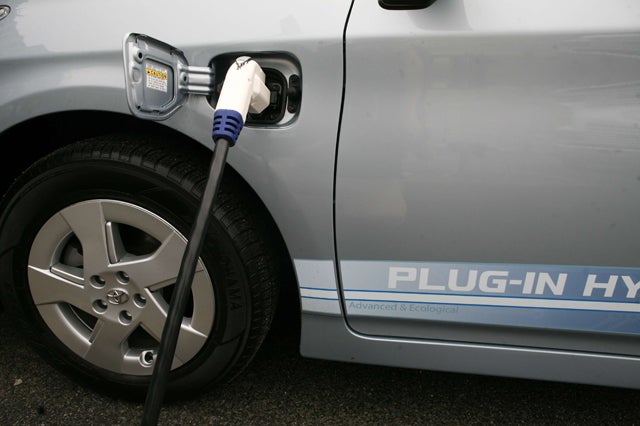As a congressional panel looks into federal support for a major electric vehicle charging station manufacturer, more questions about the company’s political connections are surfacing. They speak to a virtual constant among recipients of federal “green energy” money: beneficiaries enjoy significant political connections.
The company in question, Ecotality, has received about $125 million in federal money under the Obama administration. It was the subject of a three-part series at Scribe earlier this year, which examined a Securities and Exchange Commission subpoena relating to potential insider trading by top company executives, large bonuses paid to executives despite the company’s shaky financial footing, and Ecotality’s focus on securing federal backing.
The latter point bears revisiting in light of newly uncovered facts about the company’s connections in Washington.
On a July 2007 shareholder conference call, Ecotality CEO Jonathan Read put it bluntly: “I’m a political beast,” he told a shareholder, “and playing the political card is something that when the time is right we’re going to play very hard.” Asked when that time might be, Read answered, “you call in your chips when you have a specific project you want to go after.”
It wasn’t long before such a project emerged. In the fourth quarter of 2008, Ecotality shifted its lobbying strategy. Until then, it had devoted most of its lobbying muscle to “continu[ing the] competitive bid process for DOE testing,” in the words of its disclosure forms. During the Bush administration, Ecotality received contracts to test electric vehicle technology, and lobbying efforts were geared toward continuing that relationship.
In August of 2008, then-Sen. Barack Obama announced his goal to get 1 million electric vehicles on the road by 2015. Around that time, Ecotality’s lobbying efforts, previously confined to Congress and DOE, were expanded to the White House, and to include work on “DOE projects,” a slight but significant shift in the topic under discussion.
As Ecotality put it in a December 2008 SEC filing, “we believe the focus by the Obama Administration [on electric vehicles] will provide strong funding opportunities for us and our core technologies.”
In its push to secure that funding, Ecotality hired Ziemba-Waid Public Affairs, which touted Ecotality’s eventual $99.8 million award through DOE’s EV Project on its blog. The firm boasts a “deep knowledge of the Western and Washington, D.C. political landscape,” according to the website.
But ZWPA doesn’t just have knowledge of D.C.’s workings – it has extensive ties to Homeland Security Secretary Janet Napolitano, even flouting those ties on its website under the headline “Friends in high places,” and to former Rep. Harry Mitchell (D-AZ), whose committee assignments were of particular note for Ecotality.
ZWPA founder David Waid is the former chairman and executive director of the Arizona Democratic Party. In that capacity, he “shepherded through a 2006 election cycle that was the most successful in recent memory for Arizona Democrats,” according to the Arizona Republic. Mitchell was one of two Democrats elected to the U.S. House as part of that wave. Colin Read, the son of Ecotality’s CEO, served as his campaign’s assistance finance director.
Mitchell, who would receive $5,550 in campaign contributions from ZWPA employees during his time in the House, according to the Center for Responsive Politics, sat on key panels for Ecotality’s purposes: the Science and Technology Subcommittee on Technology and Innovation, and the Transportation and Infrastructure Subcommittee on Highways and Transit.
ZWPA has other ties to Mitchell and Napolitano through the Democratic-leaning group Project for Arizona’s Future. Len Munsil, Napolitano’s opponent in the 2006 gubernatorial election, alleged that PAF, officially a non-political group devoted to voter “education,” had illegally coordinated with advocacy groups financed by the state Democratic Party, then run by Waid. A state election panel later ruled that there was not enough evidence to implicate Napolitano on that coordination.
After the 2006 election, two Mitchell campaign staffers –campaign manager Kelly Ward and volunteer coordinator Lauren Kryder – took jobs with PAF. Meanwhile, Tom Ziemba, PAF’s executive director, left to co-found ZWPA with Waid, where he would work to secure federal funding for Ecotality.
Ben Powers, a former program director at PAF, also took a job with ZWPA, where he worked from 2008 to 2009. Powers’s bio says he has worked with U.S. congressional campaigns. His online video account includes an interview with Mitchell, which, Mitchell’s comments indicate, was filmed in 2010. The year before, Powers’s organization, PMD Media, uploaded an attack ad against Eric Wnuck, then Mitchell’s expected Republican opponent.
During his first campaign for the U.S. House, Mitchell held a joint fundraiser with his then-state Senate colleague Slade Mead, who was running for superintendent at the time. Mitchell prevailed in his election; Mead did not. The following year, Mead was elected to Ecotality’s board of directors.
The Mitchell-Mead fundraiser, it should be noted, was held at the home of then-governor, and current Homeland Security secretary, Janet Napolitano.
After Napolitano was tapped for DHS secretary in January 2009, her long-time spokeswoman Jeanine L’Ecuyer took at position at ZWPA. By December of that year, however, L’Ecuyer was listed as the spokeswoman for none other than Ecotality.



























